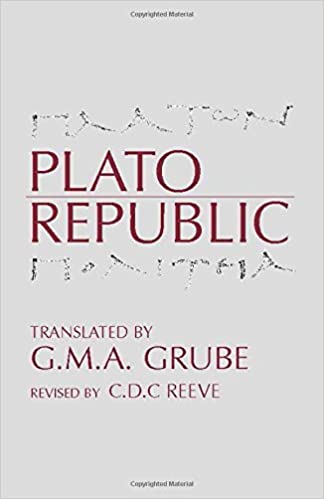A Brief Book Summary from Books At a Glance
By Steve West
Introduction
Plato (c. 428-424 BC) is one of the most influential thinkers in the history of the world, and The Republic is his most important work. Cast as an extremely interesting dialogue, the work ranges over issues of ethics, psychology, metaphysics, epistemology, aesthetics, politics, and justice. In the dialogue, Socrates attempts to determine the nature of justice by examining what a just city-state looks like in organization and government, and how this helps us in understanding what a just individual is like. Through a fascinating interplay of arguments, the conclusion is reached that an ideal city would be governed by philosopher kings. Justice is seen to be better than injustice, for the individual himself, the city, and the gods.
Summary
Book I
Socrates asks Cephalus about old age, and Cephalus maintains that he doesn’t miss the pleasures of youth—he is free from the tyranny of passions. Money is nice to have, but it isn’t enough to make a miserable man happy. Since approaching death makes us examine our lives, it is good to have lived justly, and money can help with that since it keeps us from needing to lie or steal. Socrates wonders if justice is really reducible to speaking truth and paying debts, since there may be times when these things are harmful. Polemarchus maintains that justice is harming enemies and helping friends, but Socrates argues that it is unjust to harm anyone (since harm makes people less just and virtuous).
Thrasymachus interjects that Socrates is just asking questions but should give an answer about what justice is, but Socrates claims he can’t answer because he doesn’t know. Thrasymachus then defines justice as the advantage of the stronger. Socrates leads out an inconsistency in Thrasymachus’ account, and then notes that crafts (like medicine or horse-breeding) use knowledge for the advantage of others (e.g. the patient or horse) rather than the self. Knowledge, then, does not seek its own advantage: a ship’s captain does what is best for sailors, and a ruler ought to do what’s best for his people. In response, Thrasymachus asserts that injustice is stronger than justice, since unjust men profit the most.
Socrates argues that rulers get paid wages since they rule on behalf of those who are weaker—they need compensation because they don’t rule to their own advantage. More than for honor or money, they rule to avoid the shame of being ruled by someone worse than themselves. If injustice is better, than injustice is included with wisdom and virtue, and unjust people are clever and good. An unjust person tries to outdo others like himself, but a just person doesn’t: wise and good people don’t try to outdo those who are like themselves, so an unjust person can’t be wise and clever. Justice rather than injustice goes with wisdom and virtue. Since wisdom is required to excel, then justice is necessary and more helpful than injustice.
Injustice produces hatred and conflict so that nothing can be accomplished. Unjust people need to work together for many schemes, but unless they operate together with some justice they will only fight with each other. Just people are happier than unjust ones, since justice is the peculiar virtue of the soul. A just person lives well, and those who live well are happy, so it is never better to be unjust. Nevertheless, Socrates says that unless justice is defined, nobody can know if it is a virtue or not, or if the person who is just is truly happy or unhappy.
Book II
Socrates suggests that justice is good because of what it is and what comes out of it. Glaucon argues that many people think justice is good because it brings rewards and praise, but it is also something to be avoided if possible because it’s burdensome. He will praise injustice to see if such praise is convincing. Those who practice justice do so because they aren’t strong enough to get away with injustice: we know that people will do whatever they can get away with, which shows they value injustice more. A man who could be perfect in injustice could cover it up, thus getting a reputation for justice and all of the attendant rewards. A perfectly just man wouldn’t accept all the rewards lest people question his integrity, and thus would appear to be lacking justice visibly. The gods have made life work in such a way that the unjust person is happier.
[To continue reading this summary, please see below....]The remainder of this article is premium content. Become a member to continue reading.
Already have an account? Sign In
